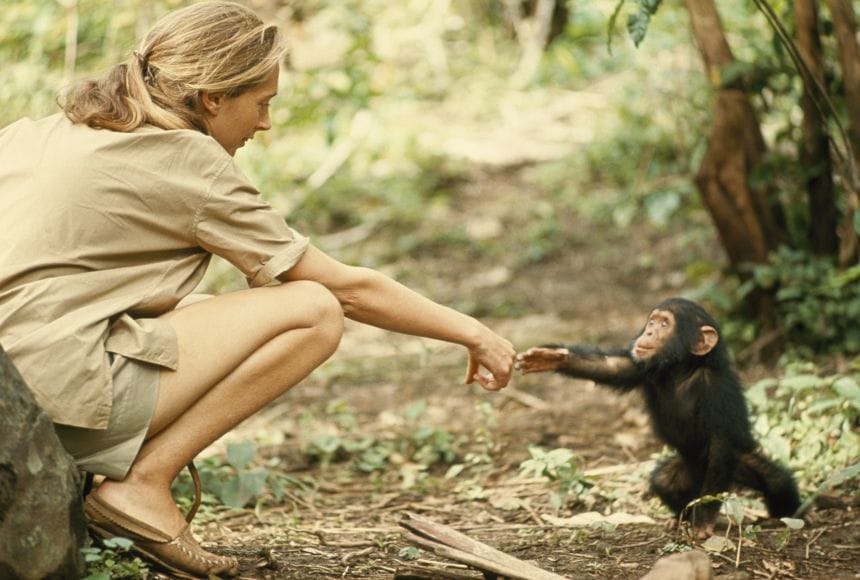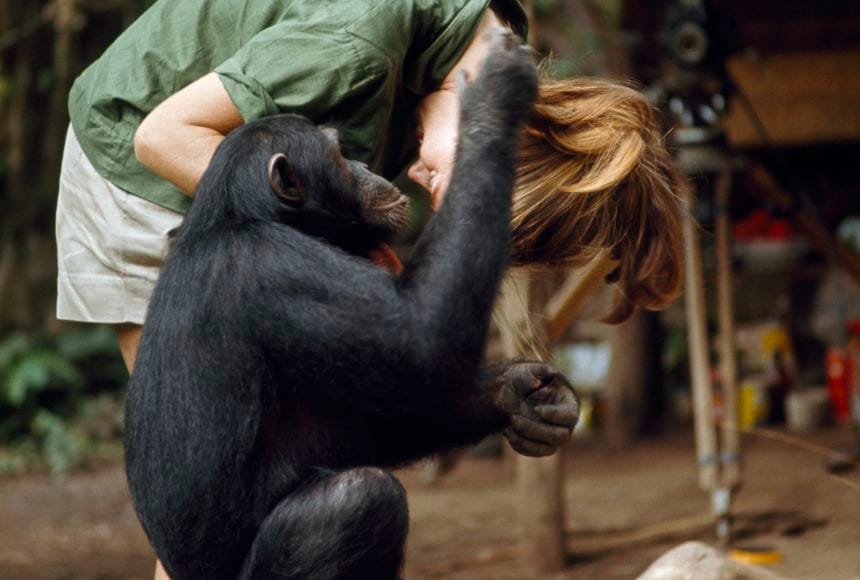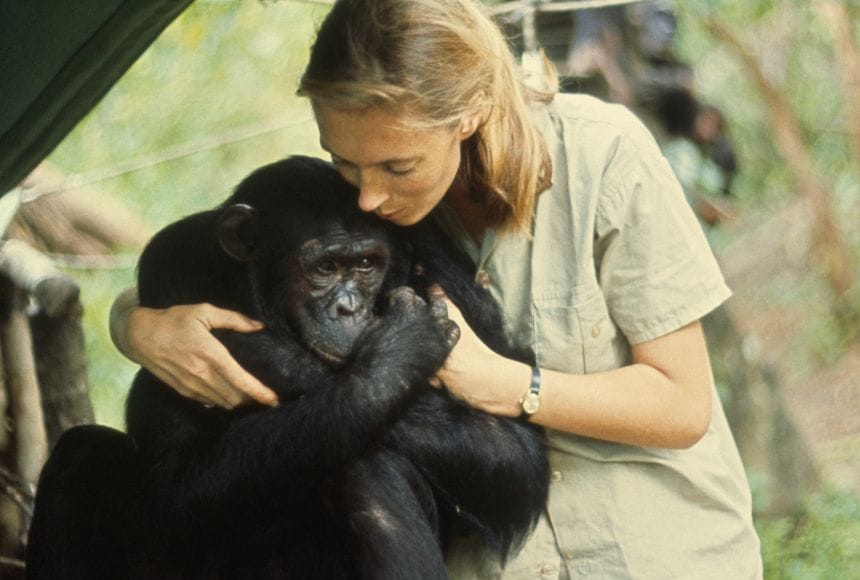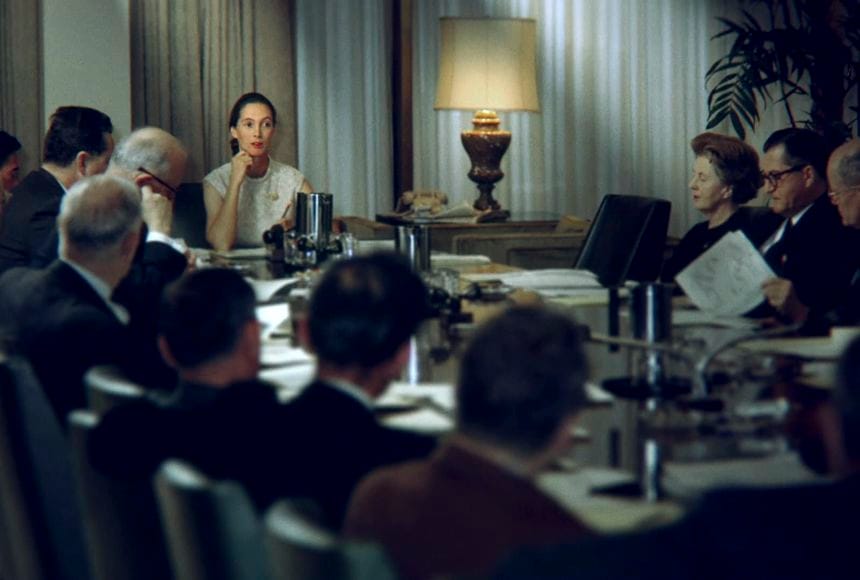In memory of Jane
"What you do makes a difference, and you have to decide what kind of difference you want to make"
Jane Goodall
For most of us, she was the loveable silver-haired conservationist who spoke at the United Nations, delivered incredible TED Talks, and traveled the world 300 days a year, advocating for nature.
But for scientists around the world, there is so much more to Jane Goodall and the story of her life’s work. One of a kind, they remember her fondly as the young researcher who followed wild chimpanzees through the forests of Tanzania for weeks on end, making groundbreaking discoveries.
The one who gave chimps names instead of numbers. Who saw personalities where others saw specimens. Who changed everything we thought we knew about ourselves and the animals we share this planet with.
Last week, the world said goodbye to that singular force. Jane died peacefully in her sleep on October 1st at age 91, while on a speaking tour in California. Still fighting for her cause, and reaching out with hope and wisdom for the next generation.
Her story isn't just remarkable because of what she discovered about chimpanzees—though those discoveries did make us rethink what it means to be human. It's remarkable because of how she lived. With curiosity as her compass. Purpose as fuel. And a playful, childlike wonder that never, ever dimmed.
Jane embodied what we call the 3 P's: Potential, Purpose, and Play. And her legacy? It's a beautiful invitation for us to lean into those same intrinsic motivations in our own lives.

Jane Goodall’s scientific career started with a phone call when she was just 23 years old.
It was 1957, and she’d been working as a waitress and a secretary. She had no university degree, no scientific training. But she had educated herself on animals, poring over everything she could get her hands on. She wanted, desperately, to find a way to work with them.. So she picked up the phone and called Dr. Louis Leakey, the renowned paleoanthropologist who was uncovering spectacular fossils of early humans and apes in Africa.
Just like that. A cold call to one of the most famous scientists in the world.
Jane impressed him so deeply that he offered her a job—first as his secretary at the National Museum in Nairobi, then as an assistant at Olduvai Gorge. Leakey saw something in her: patience, attention to detail, a love of adventure and an unshakeable passion for animals. He was looking for a chimpanzee researcher. And boy had he'd found one!
In 1960, Leakey sent her to Gombe Stream Research Center in Tanzania to observe wild chimpanzees. The scientific establishment was skeptical. A young woman with no degree? Alone in the jungle? Studying wild animals by just... watching them?
But Jane didn't need anyone's permission. Binoculars and notebook in hand, she decided to jump straight in.
The chimpanzees ran from her at first. They'd never seen a "white ape" before, as she called herself. So she climbed to a peak each morning before dawn and watched them from afar through a spotting scope. For weeks. For months. Patient, persistent, curious.
Then, slowly, they began to tolerate her. One day, a chimpanzee she named David Greybeard—the first to accept her presence—did something that would change science forever.
She watched him deliberately break off a stalk of grass, strip it clean, and slip it into a termite mound to fish for insects. He was making a tool. Creating something to solve a problem.
Jane sent word to Leakey. His response became legendary: "Now we must redefine 'tool,' redefine 'man,' or accept chimpanzees as humans."
Jane's potential wasn't determined by credentials, academics or even following the status quo. It was determined by curiosity, courage, and a willingness to follow her passion. A willingness to “find her bliss,” as Joseph Campbell might say.
She proved that you don't need permission to pursue your calling. You just need to have the courage to start from where you are.

Jane didn't just observe chimpanzees. She respected them deeply — seeing them as individuals with rich, complex lives.
The longer she watched at Gombe, the more distinctive they became. Some were dominant, others languished at the bottom of the hierarchy. Some were kind. Others were cruel. Many were both. She saw them hold rain dances. Engage in organized warfare. Commit acts of violence, including infanticide. And she also saw them hug after being apart, play silly games, and grieve when they lost each other.
She gave them names—David Greybeard, Goliath, Flo, Frodo—at a time when scientists insisted on numbering animals to avoid "emotional attachment." She wrote about their personalities, their emotions, their family bonds… Even when peers criticised her for anthropomorphism.
"She opened the window into the mind of chimpanzees," said Martin Surbeck, an evolutionary biologist at Harvard. Her work sparked a paradigm shift—scientists began recognising that many animals, not just chimps, have personalities and emotions.
But in 1986, everything changed.
Jane attended a primatology conference where every presenter mentioned the same devastating reality: deforestation at study sites around the world. Chimpanzees were disappearing.
So she made a decision. She would leave her beloved Gombe and become an activist, driven by an uncompromising desire to protect the environments she was studying.
She founded the Jane Goodall Institute in the late 70s to fund scientific research and conservation projects worldwide. And in 1991, she launched Roots & Shoots—a program that began with just 12 high school students in Tanzania and now operates in over 75 countries, empowering young people to lead conservation and humanitarian projects in their communities.
"She was so good with young people," says Jeanne McCarty, who previously led Roots & Shoots and traveled with Jane. "She kept her own curiosity and energy and enthusiasm that we all have as children and sometimes lose. I never saw her lose that."
Jane spent the last 35+ years of her life on the road—speaking, fundraising, mobilizing. She became a UN Messenger of Peace in 2002, and received the Presidential Medal of Freedom from President Biden in January 2025.
Along her hero’s journey, her purpose evolved: from personal passion to collective responsibility, from observer to advocate. From I to We. Knowing that “the greatest danger to our future is apathy.”
She leaves us with a kind but fierce sense of hope in her final interview with Netflix’s Famous Last Words (recorded mere months before her passing):
"There's so much we have still to discover. I know when I'm gone, there'll be more and more discovered if we can save the planet in time."

You could say Jane’s first ever encounter with a chimpanzee was at age one, when her father gifted her with a stuffed toy named Jubilee. Family friends were dubious: would give her nightmares?
Instead, it sparked a lifelong affinity with animals. Jubilee sat on Jane's dresser in London well into her 80s, fur worn smooth from decades of affection.
At four, you could often find Jane hiding in the henhouse for hours, waiting patiently to witness a chicken lay an egg. It’s said her family even called the police once, having no idea where she was!
Then it was all about Tarzan, and her dreams of going to Africa to live with animals and write about the experience. “I was terribly jealous of Tarzan’s Jane,” she joked much later in life. “I’d have been much better as a mate for Tarzan myself!”
This playful, rebellious spirit shaped an entire career. In many ways, she never stopped being that curious little girl… And this became her superpower, leading to all kinds of creative publications and revolutionary scientific collaborations.
Even in the final stages of life, you can see and feel her infectious sense of curiosity. We love her philosophy on death, which feels like a masterclass on AAA mindset muscles:
"My next great adventure, aged 90, is going to be dying,” she shared in a 2024 BBC interview.
“There's either nothing or something… If there's nothing, there's nothing, that's it. If there's something, I can't think of a greater adventure than finding out what it is. I happen to think there is something because of experiences I've had, because of experiences other people have had, very powerful ones.”
Talk about acceptance, agency and appreciation in action - all channeled through a playful, curious lens.

A lasting legacy
There will always only be one Jane Goodall, but her legacy lives on. And as she’d insist, this really is just the beginning. There’s so much work to be done for the planet we’re lucky enough to call home. We all have the opportunity to make an impact.
Thank you, Jane, for your beautiful work. For the chimps, the forests, for believing in kindness, compassion, and investing in the next generation.
For showing us what one person can do when they refuse to give up.
Curious about the 3 P’s, and how you can bring them to life within your own journey?
We’ve got just the thing! Check out our most-popular program, Unlocking Your A-Game, to get started.